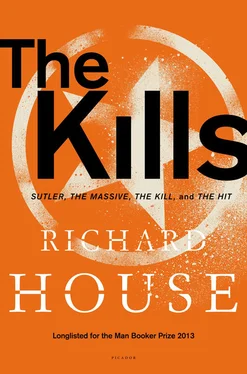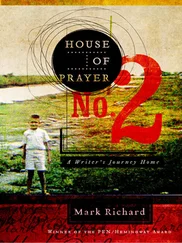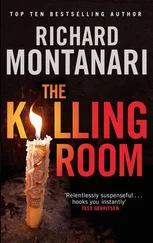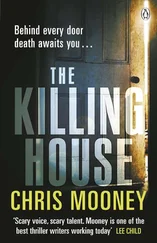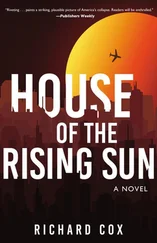‘When you find Sutler, you need to inform me directly, and we’ll call in the proper authorities to arrest him. You shouldn’t approach him. I want to hear from you directly. I spend my day assuring people that this is under control. In three weeks an enquiry opens into the Massive. I want them to know that we’re close to some kind of resolve, that we’re working together. Better still, I want a result. I want this over.’
Parson didn’t want to admit he was nowhere near close when it came to anticipating the man’s movements: it wasn’t that Sutler was unpredictable or impossible to anticipate, he’d simply disappeared as if he’d never been there. Sutler, with one verified sighting in Anatolia, was less substantial than dust, an absolute zero. ‘If you want me to continue looking for this man I’ll need more information.’ Parson felt the responsibilities of his job. ‘I have next to nothing from you, no employment file, no details. I have his date of birth but there’s no birth registered for a Stephen Lawrence Sutler on that date in the UK. London are checking this, but there’s no tax record, no National Insurance, no prior address. I know nothing prior to his arrival in Iraq. I have no idea where you found this man. I need to speak with whoever gave him this contract.’
Geezler promised assistance. ‘I have people looking here. It’s likely that he came through Iran or Syria on a different passport. If he was working with Howell, then Howell could have prepared this a long time ago as he understands the systems we use. The only way to trace Sutler is through the accounts, and because of the damage to Howell’s office we don’t have the full record. All we know is that the amounts were transferred by Howell under Sutler’s authorization. I’d keep an eye on the banks at the major cities. Istanbul, Ankara. He isn’t going to be able to move that money around in a small town, not without being noticed.’
‘I have no information about these accounts.’ Now Parson felt disadvantaged. ‘If he has access to money I doubt he’d stay long in Turkey. He could manage this money online or through another party, no one would know.’
Geezler cleared his throat. ‘Would you trust that amount of money to an online transfer? I’d look at the banks, the international banks — Istanbul, Izmir, Ankara.’ Geezler’s voice became hesitant. ‘If Stephen Sutler had one of these accounts he would be aiming to recover that money. Find the money and you find the man.’
* * *
Parson spoke with his wife. Her call came immediately after his discussion with Geezler. Her voice, denatured by the connection, suffered stutters, breaks, and hesitations. She wanted to tell him something, and warned him to listen before he made any comment. Would he promise to do that?
‘I don’t want to stay in Nottingham,’ she said. ‘I don’t, I know I don’t. I’d rather be on my own, back at home. There was a bonfire here in Wilford, by the river. A bonfire organized by the Rotary Club. And this man, a resident, threatened a volunteer helping with the car parking.’ Was he following? Did this make sense? ‘This man threatened the volunteer then returned twenty minutes later to beat him up. At a charity bonfire. In Wilford. It’s not the Middle East,’ she said, ‘it’s Wilford, Nottingham. I don’t want to be among these people. They complain about a charity bonfire, and right on their doorstep there are children as young as eleven selling drugs along the river. This, they could care less about. This is fine. Children on bicycles selling drugs. Children with dogs, Alsatians, children who hiss at you, who make suggestions of what you might like to do for them as you make your way home.’
Parson let her anger ride, anticipating its conclusion.
‘Your sister agrees, I’m better going home. I can’t do anything here. I feel useless. I’m waiting. That’s what I’m doing. I have three months of waiting. If I need to come back I can come back. I would rather be on my own. I was going to write, but I thought that if you called and I wasn’t here that you would worry and I don’t want you to worry. I wanted to tell you so you wouldn’t worry.’ She paused, a beat, as if to prompt him. ‘I wanted to tell you because you’d understand.’
‘I’ll call Gibson. He has contacts with the RAF. He’ll send some planes,’ Parson replied, ‘we’ll take Wilford off the map.’
‘You promise?’
‘I promise. The name will be forgotten. It will be a crime to speak of Wilford. Superstitions will start.’
It took them longer each time to close the conversation.
‘Soon,’ she said, ‘I’m not counting, but stay in Turkey.’
‘I’m not sure it’s possible. If nothing comes up they’ll send me back to Iraq.’
Laura consoled, advised, suggested solutions which would not fit, ideas which illuminated the gulf between how he spent his days and how she spent hers. He couldn’t begin to explain.
‘Isn’t there anyone you can speak with?’
Parson said no. It simply didn’t work like that. As long as the claims kept coming from Iraq, Gibson would keep him on site. It was simply cheaper than sending someone from London every time.
You’ll think of something, she said, because you have to. ‘You’ll figure this out. You’ll cook something up.’ Her voice rang with a clear faith, or this is what he supposed she intended.
Parson promised he would do what he could, and the line clipped short.
* * *
He sat in his car, sulky at the prospect of an eight-hour drive back to Kopeckale, his wife’s voice lingering with him. The whisky he’d drunk tasted of smoke, of cigarettes. Laura was right. The longer he remained in Turkey the less likely he would return to Iraq — and Gibson would send him back to Iraq the moment the search concluded. As he slipped the printout of Sutler into the folder an idea occurred to him: If you set a device in an office, if you knew that this was going to explode, you would be running, and you would be running away. You would be running with your back to the explosion. You would not face the blast if you knew it was coming, not without protecting your face. You would not have scratches on your face. It would be unlikely.
There could be many reasons why Sutler had turned: a door that would not open, an unexpected delay, but surely, he would have protected himself, cringed, shied away? It would only be natural. The simple fact that Sutler had not escaped the building restored his idea that the man was moving by accident, not design. These new ideas did not sit well.
He sat for a long time and considered the situation. HOSCO had refused to settle with the widow of the translator Amer Hassan, and while this was not related, he found that he could not sympathize with their current trouble. It seemed just to him that HOSCO would have to struggle, and he no longer liked the idea that he was assisting them. The longer he ran after Sutler the less time he would spend in Iraq. He saw no harm in manufacturing, no, not manufacturing, but enhancing evidence. He did this already when he needed to sway a claim one way or another, although he’d failed to do so in the Hassan report. These shifts, these inflections, would depend on tiny amplifications, nothing concrete, nothing extravagant, just a matter of small unconfirmed sightings, hotel bookings, taxi rides, travel arrangements, spare and harmless details to keep Geezler off his back while he continued with his search. Geezler also remained a question in his mind, although he could not properly formulate why. The information about the bank accounts, about Sutler being responsible for the attack on Southern-CIPA, about Sutler giving gifts of watches and whisky to the men at Camp Liberty (when Pakosta and Clark had admitted that Howell had provided these gifts), was all conjecture. Too eager to bend the facts to suit a particular reading Geezler sounded like a man trying hard to convince. He probably didn’t even know he was doing this.
Читать дальше
